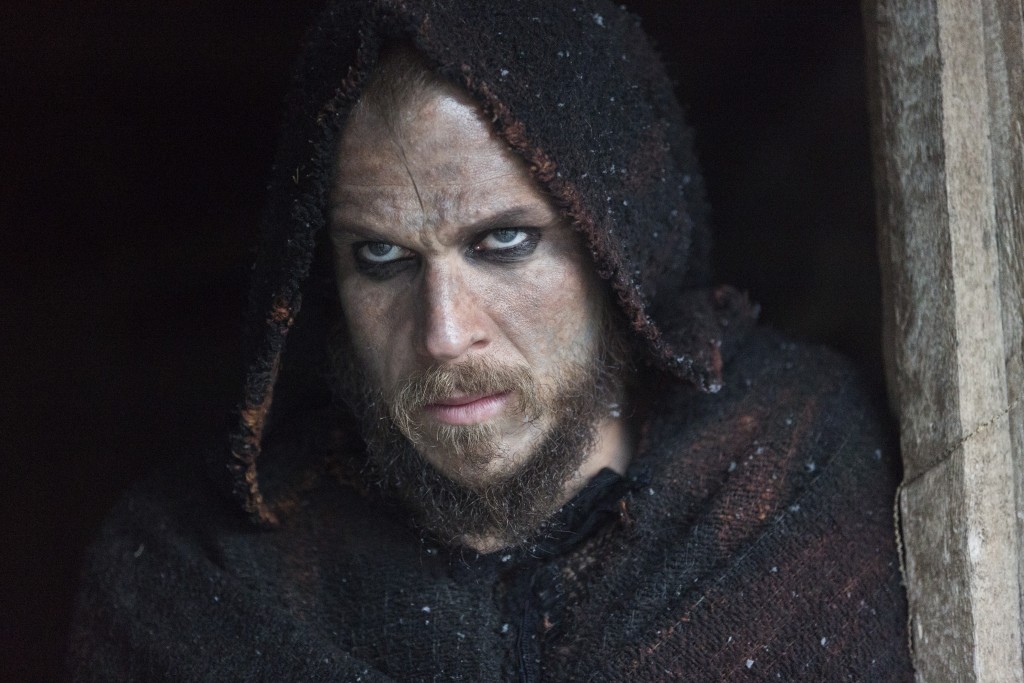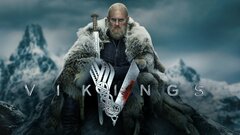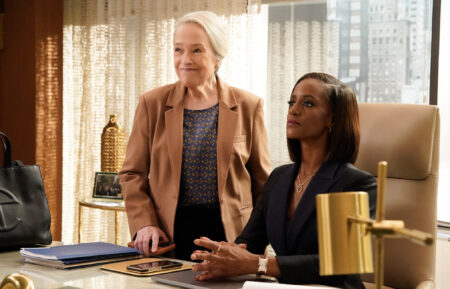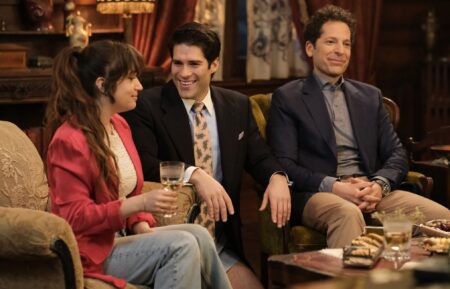‘Vikings’: Does Floki Deserve Your Sympathy? Gustaf Skarsgård on His Character’s ‘Tough Year’

Warning: mild spoilers ahead about last night’s episode.
In his first full episode of freedom this season, Floki (Gustaf Skarsgård) skulked the outskirts of Kattegat as an outcast, still reeling from the physical and emotional torture he’d endured. But two conversations from last night’s episode—first with the mysterious Seer (John Kavanagh) and then with Aslaug (Alyssa Sutherland) and Ivar (James Quinn Markey)—may have given him the spiritual validation he needed to find a new path forward.
We talked to Skarsgård about what Floki has been through so far in Season 6, his undeniable air of mysticism and what’s coming up on Vikings as the series moves through its 20-episode season.
What was it like filming the scenes where you were chained up and being tortured?
It was kind of tough. I mean, the toughest part was just preparing for it. It really is all about suffering in the first three episodes for Floki. So that was obviously tough on me because I had to bring it to the character, just trying to imagine what you would feel like getting the news that your child was dead, and all the other hardship he’s going through. So that was very demanding.
Ragnar’s (Travis Fimmel) punishment for Floki was based on a story from Norse mythology in which the gods bind Loki in a cave, with venom dripping on his head. Have you studied those mythologies?
Oh yeah, for sure. I’ve really read into their religion, the Old Norse religion and the sagas. I was interested in it even before I got the part, but then as I got this job, I definitely read more of that.
When did you start reading the mythology?
I never studied it per se, but being Swedish, we would learn about the Vikings and their culture and religion in school. And I did a couple of essays on Vikings and stuff like that when I was in high school, just because I was interested. So that history has always been appealing to me.
In last night’s episode, we saw that Floki has become something of an outcast. How would you describe his relationship with Ragnar at this point?
Oh, it’s very complicated. Very complicated. It’s almost masochistic in the sense that he still longs for Ragnar’s love, and he always will, but he also resents Ragnar for having put him through the shame and the pain of the punishment. I think a part of him is just like, “Why didn’t he just kill me?” He’s definitely not grateful that [Ragnar] spared his life, because from Floki’s perspective, he hasn’t done anything wrong. From Floki’s perspective, he actually saved Ragnar from the influence of Athelstan and this false God of Christianity, so he [doesn’t] realize that he would deserve a punishment in any way.
Now that his daughter is dead and his relationship with Ragnar is strained, what would you say Floki’s motivation is moving forward? What’s his goal now?
I would say that he’s very lost, especially in Episode 4. When we first pick up with him, he’s very lost. He doesn’t know where he’s going. I never understood why he stuck around in Kattegat anyway and didn’t just take off, but I think there’s that weird longing that he still wants Ragnar’s love back. As much as he resents him, and as complicated as it is, he still longs to get back to that love and that relationship they once had.
Queen Aslaug has brought Ragnar’s son Ivar to Floki to learn to love the Norse gods and to hate the Christian God. Is this something that gives Floki a new sense of purpose?
Definitely. I think he’s very flattered by that recognition from Aslaug. That someone has actually recognized what Floki is about and what he’s been trying to do—the act of killing Athelstan as a way to protect Ragnar and to protect the old ways for these people—there’s definitely a sense of recognition in that. And this will also form a close relationship with Ivar forever. I can’t say how much we actually get into that tutoring, but at least we establish that that has happened. Floki has taught him about the old ways and the old gods.
PHOTOS: Vikings Scenes From Season 4
Does it anger Ragnar that Aslaug has brought Ivar to Floki instead of to him for that kind of teaching?
I’m not sure if that’s ever actually commented on. I can’t remember that from the episodes, but I don’t think it is. I think that is done secretly, without Ragnar knowing it.
Floki has a mysterious encounter with The Seer in this episode. The Seer claims to know who Floki is, and that he has been waiting for Floki for hundreds of years. What does it all mean?
I don’t want to answer that question, because by answering, I think I would simplify it. And I love the mystical element of it, that we don’t exactly comprehend what that could mean. I don’t want to simplify it by giving an easy answer, but that is definitely something to appeal to people’s sense of fantasy, what it could mean. That is nothing we will reveal easily.
In the past, The Seer’s predictions have been mostly true, but very cryptic.
Yeah. I think, especially for Floki emotionally, it’s also a recognition of who he is. The same way that he’s also recognized by Aslaug, by her bringing Ivar to him, now he gets this recognition from The Seer. Whatever he means by this, there’s definitely a recognition of Floki and who he really is, and I think that kind of ignites Floki again after all the hardship that he’s been through. It’s a reason for him to go on, to live on.
So his religion and devotion to the gods is all that’s keeping him going?
Yeah, you could say that. He’s always been devoted to the gods, having done what he did, killing Athelstan and then facing the failure in Paris and then being prosecuted and tortured by his best friend. Now here, he has two people who actually come to him and recognize him as something almost holy. I think that is exactly what he needs at this moment in time.
The Seer might be beyond explanation, but will we get any more answers about Floki’s mysticism before the end of this season?
I don’t know. The thing about that element of the show that I really like, the mysticism, is that it’s more about portraying the subjective beliefs of these people. There are many, many types of potential interpretations. Is Floki the incarnation of a god? Is he someone who just needs to hear that he’s special in this moment in time? I just like the fact that all those questions are raised and not necessarily answered. With spiritual things, I think that’s often the case, that you don’t exactly know. This is the realm of the unknown, and as soon as you start choosing one interpretation, it loses its spirituality and thereby its truth, in a sense. So I think that the paradox and the multiple potential interpretations are part of the point in these matters.
This is a 20-episode season, so there’s still a long way to go. Where is Floki going as the season moves on?
I can tell you that there’s more trouble ahead. It’s definitely a tough year for Floki in every way. Yeah, Floki goes through a lot this year, and he’s just being hammered with more and more horrible experiences, really. It’s been tough.
Do you think that’s an attempt to get people to sympathize with Floki again? He nearly crossed the line into being a villain last season.
I’m not sure if it’s that easy. I just think that it’s the course of the story. I’m not sure how manipulative or conscious that would be from [series creator] Michael [Hirst]’s part, to win the sympathy back. He usually isn’t that sentimental. He’s kind of raw with his characters, and if you like it, you like it and if you don’t, you don’t. He kind of presents them the way they are, which is something I really like. But if sympathy might be a consequence of that? Maybe.
Vikings, Thursdays, 10/9c, History








